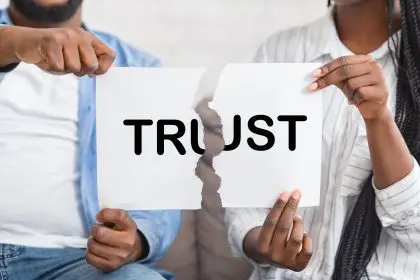Remember that intoxicating feeling when you first fell in love? The racing heart whenever they texted, the constant daydreaming, the sense that you’d finally found your perfect match. It felt permanent, almost cosmic in its intensity. So when those feelings begin to fade — sometimes gradually, sometimes with jarring suddenness — it can feel like something has gone terribly wrong. But what if the real story of falling out of love is both more complex and more hopeful than we’ve been led to believe?
Your brain was literally high on love chemicals
That initial falling-in-love stage isn’t just poetic nonsense — it’s a legitimate neurochemical hurricane. Your brain essentially marinated itself in a cocktail of dopamine, norepinephrine, and serotonin that created a natural high not unlike certain recreational substances.
This biological fireworks show has a evolutionary purpose. Those intense feelings temporarily override your critical thinking skills, allowing you to bond quickly with a potential mate. Your brain gives you rose-colored glasses that help you focus on all the wonderful qualities of your new partner while conveniently filtering out potential red flags.
But here’s the kicker — this chemical carnival was never meant to last. Your brain literally cannot sustain that level of neurochemical excitement long-term. Trying to maintain the initial passionate stage of love would be like trying to live on adrenaline — eventually, your system would crash.
What feels like falling out of love is often just your brain returning to its baseline functioning. Those chemicals haven’t disappeared entirely, but they’ve stabilized into something less overwhelming and more sustainable. It’s not that the love has vanished — it’s that it’s transformed from an altered state into something your brain can actually maintain long-term.
The familiarity paradox is working against you
Humans are walking contradictions when it comes to relationships. We desperately crave security and familiarity, yet we’re also wired to be stimulated by novelty and unpredictability. This fundamental tension creates what relationship researchers call the familiarity paradox.
In the beginning of a relationship, everything is new. You’re constantly discovering fresh facts about each other, experiencing first-time activities together, and navigating unfamiliar relationship territory. This novelty triggers dopamine release, creating excitement and pleasure with each new discovery.
Over time, as you learn each other’s stories, preferences, and patterns, that built-in novelty generator starts to slow down. The person who once seemed fascinatingly mysterious now becomes comfortably predictable. You can finish their sentences. You know exactly what they’ll order at your favorite restaurant. You’ve heard all their childhood stories at least twice.
This familiarity creates security, which fulfills one deep human need. But it can simultaneously starve another equally important need — our hunger for discovery and growth. When mistaken for falling out of love, this natural familiarity progression sends many people back to the dating pool, seeking that neurochemical high with someone new, only to repeat the cycle.
Unmet expectations become silent relationship killers
We all enter relationships with a secret rulebook — unspoken expectations about everything from how often we’ll have sex to who will take out the trash to what constitutes quality time together. These expectations often come from our families of origin, romantic movies, or social media, and they’re rarely discussed explicitly.
When reality inevitably diverges from these unexamined expectations, disappointment creeps in. The gap between what you imagined love would be and what your daily relationship actually looks like creates a constant low-grade friction that gradually erodes positive feelings.
Maybe you expected your partner would intuitively know when you need emotional support without having to ask. Or perhaps you assumed they’d share your definition of financial responsibility or your vision for the future. When these unspoken assumptions clash with reality day after day, what feels like falling out of love is often really the accumulated weight of these unaddressed expectations.
The couples who successfully navigate this challenge aren’t necessarily those who had compatible expectations from the beginning. Rather, they’re the ones who learned to identify their implicit relationship rulebooks, discuss them openly, and collaboratively rewrite them to reflect their shared reality.
The truth about communication that nobody wants to hear
We’ve all heard that “communication is key” to relationship success. But this oversimplified advice misses something crucial — effective communication is actually incredibly difficult, especially about emotional matters. Many people interpret communication problems as falling out of love when they’re actually struggling with the inherent challenges of authentic expression.
True intimacy requires revealing parts of yourself that feel vulnerable, risky, or even shameful. As relationships progress, the stakes for this kind of openness get higher, not lower. In the beginning, sharing your quirks and insecurities felt exciting. Now, bringing up a festering resentment or admitting a fear about your future together feels potentially catastrophic.
This communication paradox leads many people to gradually share less of their authentic inner world. Conversations stick to logistics and light topics. Deeper needs and concerns go unexpressed. This creates emotional distance that can be misinterpreted as falling out of love, when it’s actually a protective response to the perceived risks of genuine communication.
The couples who maintain emotional connection over decades aren’t necessarily better communicators naturally. They’ve simply built communication muscles through practice, often with plenty of awkward conversations and false starts along the way. They’ve learned that temporary discomfort during difficult conversations is far less painful than the permanent distance created by avoidance.
Life stress hijacks your relationship energy
Remember when dating was your highest priority? You’d rearrange your schedule for a midweek dinner, stay up late talking despite an early morning, and spend hours preparing for dates. Your relationship got your best energy and attention.
Fast forward a few years, and life has likely become considerably more complex. Career demands, financial pressures, health challenges, family obligations, and countless other responsibilities compete for your limited emotional and physical resources. By the time you turn toward your relationship, you might be running on empty.
What feels like falling out of love is sometimes just the reality of having less available energy for romance. Your capacity for patience, generosity, playfulness, and presence — all essential ingredients for maintaining connection — becomes depleted by external demands.
This resource depletion is especially challenging because it often affects both partners simultaneously. During particularly stressful periods, you might both be showing up as lesser versions of yourselves, creating a negative feedback loop where neither person feels seen, appreciated, or prioritized.
The couples who successfully weather these seasons recognize that relationship energy fluctuates naturally over time. They adjust their expectations during high-stress periods without catastrophizing the temporary emotional distance. They find small ways to remain connected when elaborate romantic gestures aren’t possible, and they trust in their ability to reconnect more deeply when life’s pressures eventually ease.
Your growth paths aren’t automatically synchronized
Personal growth doesn’t follow a standardized timeline or trajectory. In long-term relationships, partners inevitably evolve at different rates and sometimes in different directions. These asynchronous growth patterns create periods where you might feel like you’re falling out of love, when you’re actually just struggling to recognize and relate to the evolving person your partner is becoming.
Maybe one of you experiences a spiritual awakening while the other remains skeptical of religion. Perhaps one develops a passionate interest in fitness and health while the other maintains more relaxed attitudes toward exercise and nutrition. One might grow increasingly interested in global travel and adventure while the other discovers deeper satisfaction in creating a comfortable home environment.
None of these growth divergences necessarily mean you’re incompatible or falling out of love. They’re natural variations in human development that require continual efforts to remain curious about each other’s evolving selves. The feeling of connecting with your partner’s emerging identity can actually reignite romantic feelings that seemed to have disappeared.
The couples who thrive through decades of change aren’t those who somehow magically evolve in perfect lockstep. They’re the ones who give each other space for individual growth while maintaining a genuine interest in who their partner is becoming. They recognize that falling in love with new aspects of their familiar partner can be just as exciting as the initial courtship was.
Passion needs polarities to survive long-term
Romantic attraction thrives on a delicate balance of sameness and difference, closeness and distance, security and uncertainty. Over time, many couples unintentionally eliminate these essential polarities in ways that dampen erotic connection and emotional excitement.
In the quest for harmony and conflict avoidance, partners often begin mirroring each other’s preferences, adopting similar perspectives, and merging their identities. While this creates comforting predictability, it can simultaneously extinguish the attractive tension that sparked passion initially.
Similarly, the pursuit of constant closeness — sharing every thought, spending all free time together, monitoring each other’s whereabouts — can paradoxically diminish desire. Without some psychological space between you, there’s no distance to cross with longing, no separate self to discover with curiosity.
What feels like falling out of love might actually be the natural consequence of eliminating the very polarities that create romantic tension. Reconnecting with your distinct perspectives, cultivating some separate interests, and maintaining healthy boundaries within your togetherness can reignite feelings that seemed to have disappeared.
The most passionate long-term couples aren’t those who merged into a single unit. They’re the ones who managed to maintain their distinct identities while building a life together. They’ve learned to value rather than resolve the tensions between their differences, recognizing that these polarities fuel continued growth and desire.
Understanding why people fall out of love doesn’t guarantee you’ll avoid the experience. But it does offer something equally valuable — the perspective to distinguish between temporary relationship challenges and truly irreconcilable differences. Sometimes what feels like falling out of love is actually an invitation to love more consciously, to move beyond the chemical highs of early romance into the deeper, more complex territory of mature relationship. The butterflies might disappear, but what replaces them can be even more extraordinary if you’re willing to grow into it.

















